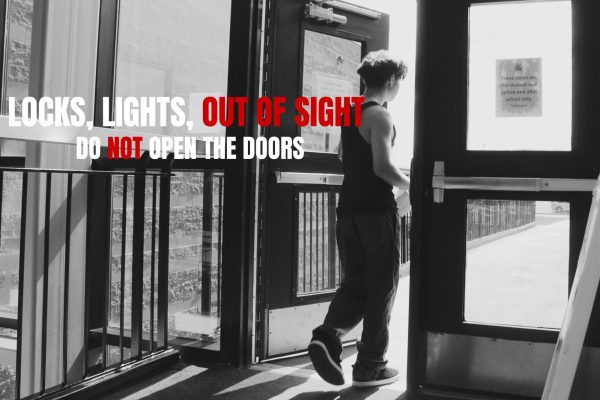You Don’t Have to Respect Human Rights [Opinion]
Trump was censored. It was inevitable given his actions, and likely even a net positive for short-term harm prevention – but it was a deplatforming of the president all the same, and it made a lot of people anxious about the political influence of social media corporations.
Republicans felt especially cheated here. “Yet another example of liberal media bias trouncing on the right to free speech that defines our society,” they cried, “this time so vile as to end the political career of the commander-in-chief! We can’t allow social media to hold this much power.” To which the liberals responded, “Aren’t you the ones who insist on the right of corporations to kick whoever they want off their property? Social platforms included? Careful what you wish for~.” And in turn one might have replied not with a critique of this argument, but a reminder of its implication, one which the liberals support but don’t dare recite aloud: “Wouldn’t that imply that human rights are a bad idea?”*
Well, yes, actually. Human rights are garbage, and here’s why.
Philosophical Arguments for Individual Rights
The American reading of human rights took most of its influence from the philosopher John Locke, as I’m sure we all learned in eighth grade social studies. But what we didn’t then linger on is the fact that his line of reasoning was little more than a circular word-game.
The argument goes like this: Humans are owned by God; this implies that property exists, and that humans in turn have control of their own property — but can you prove that God exists, let alone the Christain one? And if so, what does it even mean for God to “own” humans? Why does that naturally extend to a human “right” to own something? Read the Stanford Encyclopedia of Philosophy entry on the matter and you’ll find no answer, because a good-faith effort at systematizing natural rights from the top down would only open up the endless semantic wormhole that is ontology about social constructs – you can’t exactly determine the god-given nature of an idea you just made up.
And yet, because this sort of moral intuition managed to hide behind the name of reason all throughout the Enlightenment (see Kant’s categorical imperative for the pinnacle of this attitude), the work of Locke and others like him was not only taken seriously, but embraced as a mission statement for actual existing governments; the Declaration of Independence’s “life, liberty, and the pursuit of happiness” is of course an echo of Locke’s “life, liberty, and property.”
So there’s the initial proof of America’s concept of rights thrown into serious question. That’s not quite the end of the story, though, because there have been a few attempts at retroactively producing a better proof for the American concept of innate rights in the years since, most notably that of novelist-philosopher Ayn Rand. Vehement atheist and staunch defender of capitalism (unsurprising, given that capitalism was historically the biggest driving force behind the concept’s popularity besides religion itself), her post-hoc justification for the sacred status of rights is a little more complicated.
First, she claimed that the purpose of morality is to outline the behavior proper to a given being; the proper behavior in question would follow from the being’s nature. And because a human’s nature compels it to preserve its own own life and strive for happiness, self-interest then becomes the human moral ideal. This, in turn, makes it “right” to keep living, to live free of the influence of those who would force you to act against your own life, and to take resources as your own for the sake of better living. Hence the right to life, liberty, and property.
But isn’t all this just another word game? I mean, Rand, right from the start you’re using “proper” in two different ways: describing a behavioral imperative and describing what’s in line with a specific set of standards. Pick one and the other crumbles; humans wanting something doesn’t make it a moral “ought.”** And the same goes for your reframing of the word “right” – you’ve in the span of a sentence gone from explaining what a person should be free to do to what others should have to respect, and those are not compatible uses of the word at hand.
So there you have it: unless I’ve missed some better argument, human rights aren’t a moral ideal that anyone fundamentally needs to respect. We can now turn to the more practical question of if there’s ulterior reason to do it anyway.
————–
What’s the point of government?
There are three main lines of reasoning as to why we should have a government: “It protects natural rights,” “It protects the greater good,” and “It protects my self-interest.”
I’ve already talked about the problems with the first one, and can pretty easily extend that critique to the second; to again reference Kant’s idea of the Categorical Imperative, the best philosophy’s been able to come up with in defense of a morality of servitude is a simple appeal to the fact that humans do in fact tend to empathize with others and thus don’t like by default to cause them active suffering, a psychological truth which provides the illusion of universal moral reason. The vagueness of conventional morality always echoes that same human bias.
And so with that we come to the pragmatic purpose of government: protecting the interest of those who participate in it. This is where the issue of social media censorship makes a great example, because once you throw out the idea that we need to respect either the people’s right to free speech or the comapnies’ right to control your own platform, you’re now able to run an actual cost-benefit on letting social media deplatform influential voices relative to what you, personally, want to happen to the country at large. Should we trust companies to amplify voices for good and silence those of evil, or do we find ourselves better off if services so critical to the spread of information as social media remain free of such structural bias? Regardless of the answers, that’s the form our questions should take.
Where things get really interesting is with the fact that, even though they’re not by any stretch a force of obligation, the practical implementation of human rights may very well be something you think all laws on issues of speech suppression and amplification should respect, depending on where you fall on cost-benefits regarding the value of social media’s control of its own platform. I’m not here to draw a conclusion on that front, but I do want to point out that it is a potentially defensible perspective – just not on the grounds of rights as such.
So with all that said, the bottom line is this: human rights aren’t a moral imperative. Nor is conventional altruism. Nor are virtue ethics. Nor is any universal morality. Your personal values are not only valid but worth pursuing for their own sake, and alternative viewpoints serve only as a distraction from the fact that the government is nothing but a tool for shaping the world that you want to see. That’s the truth about human rights.
—————————
Footnotes:
*The statements enclosed in quotation marks in paragraph two are not actual quotes, only distillations of the sentiment expressed by those deeming Twitter fascisct/Mao-like/etc. and one strand of response the responses thereto
**I’m aware that Rand doesn’t explicitly claim that egoism a moral imperative, but her continual failure to clarify her understanding of morality as something that doesn’t deal with ‘ought’s, not merely degrees of adherence to a given set of standards (‘properness’), comes off an awful lot like an attempt to take advantage of the vocabulary of morality to frame her value system as an imperative anyway. Her regular use of phrases like “moral treason” for adherence to alternative value systems doesn’t help. And regardless, if morality is in no sense imperative, then there’s no reason for anyone to respect anyone else’s rights.

"I spend a lot of time in my room either working on youtube videos or reading philosophy textbooks, they are either these weird expressional art films...


![You Don't Have to Respect Human Rights [Opinion]](https://ghschronicle.com/wp-content/uploads/2021/02/IMG_1197-900x600.jpg)




![A Vest Won’t Protect You [OPINION]](https://ghschronicle.com/wp-content/uploads/2025/09/KoltonZuckerVestPosterOffWhite-450x600.png)
![Executive Order: Ending Radical Indoctrination in K-12 Schooling [OPINION]](https://ghschronicle.com/wp-content/uploads/2025/04/Screenshot-2025-04-23-at-2.51.41 PM-600x337.png)




Zakarya Bentameur • Mar 8, 2021 at 12:31 am
Based.
Lain Iwakura • Mar 5, 2021 at 2:44 pm
she really do be outing herself as a pegasister ‘anarchist’ in that thumbnail – look at the “who to follow” list lol